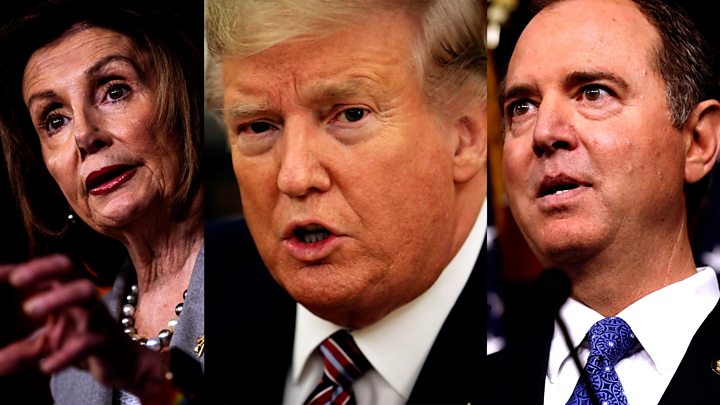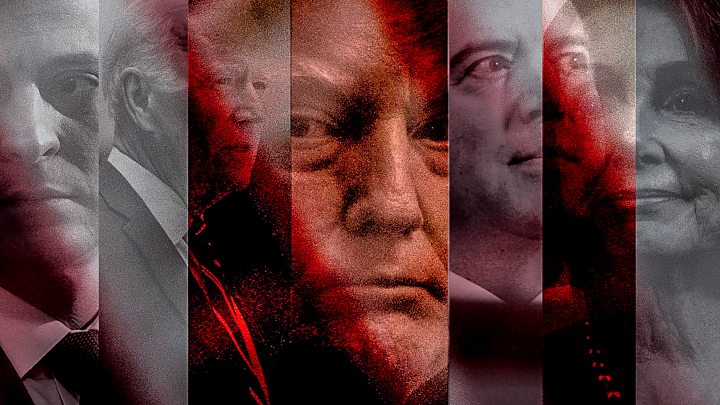The 100 lawmakers of the US Senate were sworn in on Thursday as jurors for the impending impeachment trial of President Donald Trump.
Chief Justice of the Supreme Court John Roberts administered the oath to the senators to “do impartial justice”.
In the coming weeks, the senators will decide whether Mr Trump should be removed from office over charges brought by the House of Representatives.
The trial is scheduled to begin on 21 January.
Justice Roberts asked the senators, “Do you solemnly swear that in all things appertaining to the trial of the impeachment of Donald John Trump, President of the United States, now pending, you will do impartial justice according to the Constitution and the laws, so help you God?”
The lawmakers responded with “I do” before each signing in a book that they took the oath. Republican senate leader Mitch McConnell then adjourned the pre-trial proceedings and announced the trial would begin at 13:00 EST (18:00 GMT) on Tuesday.
Mr Trump is accused of abuse of power and obstruction of Congress. He has denied wrongdoing and branded the case against him as a “hoax”.
What happened on Thursday?
The Senate proceedings began with the sergeant at arms calling “hear ye, hear ye”. The articles of impeachment were then read out on the floor of the chamber by Democratic congressman and lead prosecutor Adam Schiff.
Mr Schiff is one of seven impeachment managers who will make the case against the president. He said no president had ever sought to impede an impeachment investigation so thoroughly.
Chuck Schumer, the Democratic leader in the senate, again called for new witnesses and documents to be permitted in the trial. “The gravity of these charges is self-evident. The House of Representatives have accused the president of trying to shake down a foreign leader for personal gain,” Mr Schumer said.
Senator Susan Collins, a Maine Republican who is facing a tough re-election bid this year, was seen wiping away tears from her face as the charges were read.

In the lead-up to the trial, senior Democrats heavily criticised Mr McConnell after he pledged to work in “total co-ordination” with the president – seemingly abrogating the sworn duty of Republican senators to act as impartial jurors.
Speaking after Thursday’s proceedings, Mr Schumer told reporters: “McConnell said he’s going to take his cues from the president. We are taking our cues from nobody.”
Mr Schumer said he expects a vote next week on whether witnesses will be called. He said he had not seen the resolution put together by the Republican leader regarding the rules of the trial.
Mr McConnell has not ruled out witnesses. He suggested the format would mimic the impeachment trial of President Bill Clinton in 1999, during which senators voted on which witnesses to call following opening arguments and a written question period.
As things wrapped up on Capitol Hill on Thursday, Mr Trump told reporters in the White House he thought the trial “should go very quickly”.
“It’s a complete hoax,” the president said. “A phony hoax put through by the Democrats so they can win an election.” He reiterated the sentiment in a tweet, saying he was impeached “for making a perfect phone call”.
What’s the background?
Democrats allege the president withheld $391m (£299m) in military aid in order to pressure Ukraine to investigate his political rival, Joe Biden. Mr Trump is the third US president to be impeached. The previous two – Andrew Johnson and Bill Clinton – were not removed from office.
A two-thirds majority in the Senate is required to oust a president. As Mr Trump’s Republicans control the senate, he is widely expected to be acquitted. His defence team has not been formally announced, but White House lawyers Pat Cipollone and Jay Sekulow have been tipped to lead it.

The House voted on Wednesday to send the articles of impeachment to the Senate, with the 228-193 vote split mostly along party lines.
The trial is likely to still be under way next month when Iowa and New Hampshire hold the first party votes to pick the eventual Democratic presidential candidate who will take on President Trump in November’s election. Three of the candidates – Bernie Sanders, Elizabeth Warren and Amy Klobuchar – are US senators and will have to drastically scale down campaigning to attend the trial.
Two other leading contenders, Joe Biden and Pete Buttigieg, plan to capitalise on their rivals’ diversion by blitzing Iowa in the last few days before the crucial 3 February vote in that state.



